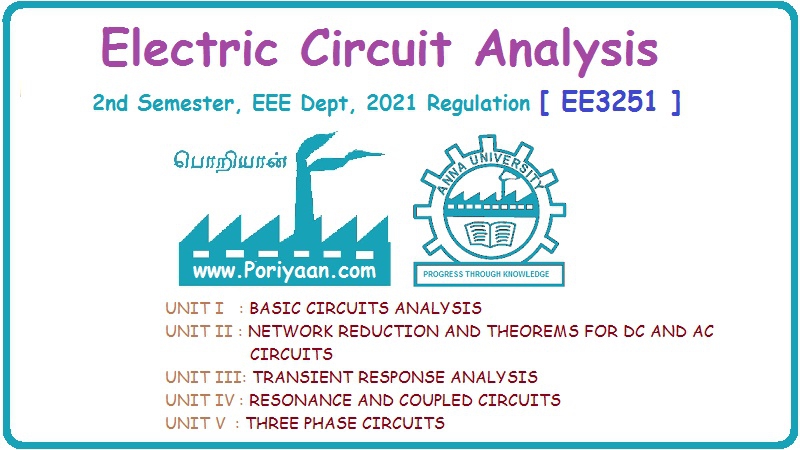Electric Circuit Analysis: Model Question and Answer
Model Question Paper with Answer - 3 (PART A)
Electric Circuit Analysis
Electric Circuit Analysis: Model Question and Answer : Model Question Paper - III
MODEL QUESTION PAPER
- III.
1. Determine the power delivered by
each source for the given circuit in the figure.
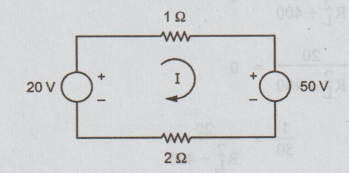
Ans
:
Nett
voltage = 50 - 20
=
30 V
Total
resistance = 1 + 2 = 3Ω
Current
= 30 / 3 = 10 A
I
flows away from positive polarity of 50 V.
Power
delivered by 50V source = 50 × 10 = 500 W
Power
received by 20V source = 20 × 10 = 200 W
2. State ohm's law
The
ratio between the potential difference across two terminals of a conductor and
the current through it remains constant, when the physical conditions of the
conductor remain unchanged. V = IR
3. State Thevenin's theorem.
Any
linear active network with output terminals A and B as shown in fig. (a) can be
replaced by a single voltage source (VTh = V0c) in series
with a single impedance (ZTh = Zi)
VTh
is the Thevenin's voltage. It is the voltage between the terminals A and B on
open circuit condition. Hence it is called open circuit voltage denoted by V0c
4. In the given circuit of the
figure, Rg varies between 2 and 55 ohms. What value of Rg results in
maximum power transfer across terminals AB? Calculate the maximum power.
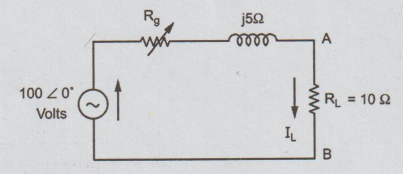 Ans:
Expressions in Page 9.74 are useful.
Ans:
Expressions in Page 9.74 are useful.
Let
the source voltage by Eg
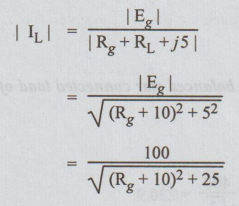
Power
delivered to RL = PL.
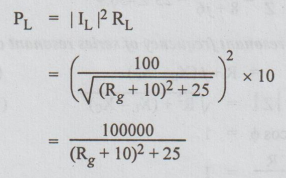
From
the above expression for PL, it is seen that Rg must be
minimum for maximum PL. As Rg varies between 2 and 55 Ω,
PL
is maximum when Rg = 2Ω
Maximum PL = 100000 / (2 + 10)2
+ 25
=
592
= 592 Watts
5. Differentiate between transient
and steady state.
Ans:
A circuit having constant sources is said to be in steady state if the currents
and the voltages do not vary with time. In a circuit containing energy storage
elements, with change in excitation, the voltage and currents change from one
state to other. The behaviour of the voltage or current when it is changed from
one state to other is called the transient state.
6.
Sketch the transients for i, VR, VL in a series RL
circuit.
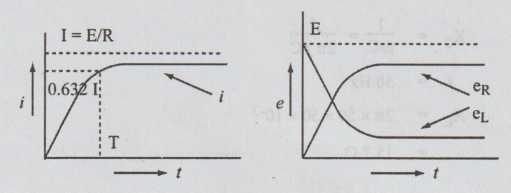
7.
List out the methods of power measurements in the three phase balanced
circuits.
(i)
Three wattmeter method
(ii)
Two wattmeter method
(iii)
Single wattmeter method
8. A
3ϕ 400 volts supply is given to a balanced star connected load of impedance
8+j6 ohms in each branch. Find the line current.
Star
connection:
IL
= Iph
VL
= Vp /√3 = 400/√3= 230.9
I
= V/Z = 230 / 8 + j6 = 23 ∠ -36.9°
9. Derive
the formula for the resonant frequency of series resonant circuit.
As
Z = R + j (XL - XC) (i)
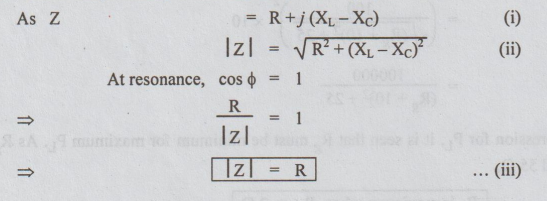
10.
Define coupling coefficient
K
= M / √L1 L2
Electric Circuit Analysis: Model Question and Answer : Tag: : Electric Circuit Analysis - Model Question Paper with Answer - 3 (PART A)
Related Topics
Related Subjects
Electric Circuit Analysis
EE3251 2nd Semester 2021 Regulation | 2nd Semester EEE Dept 2021 Regulation
